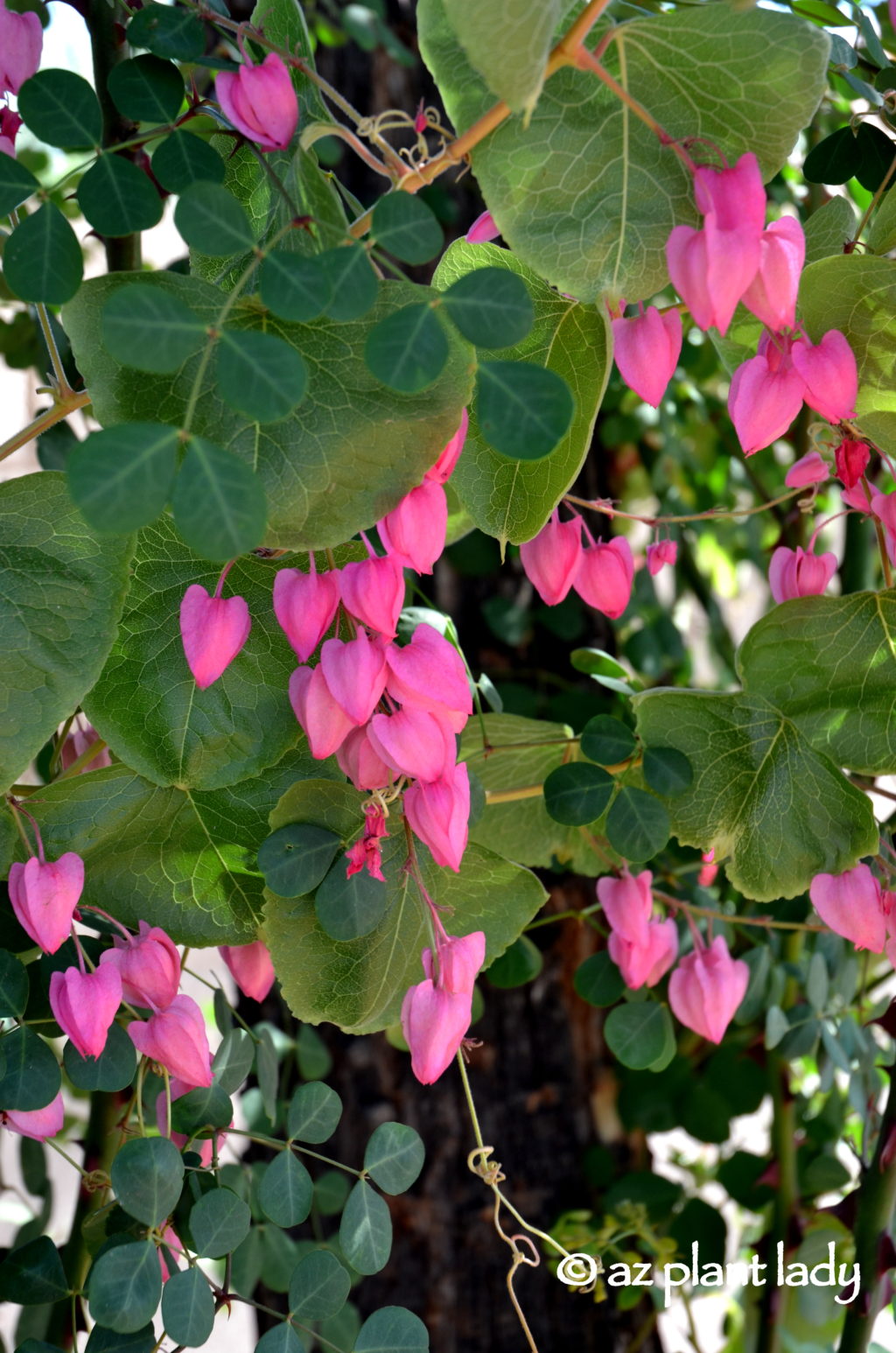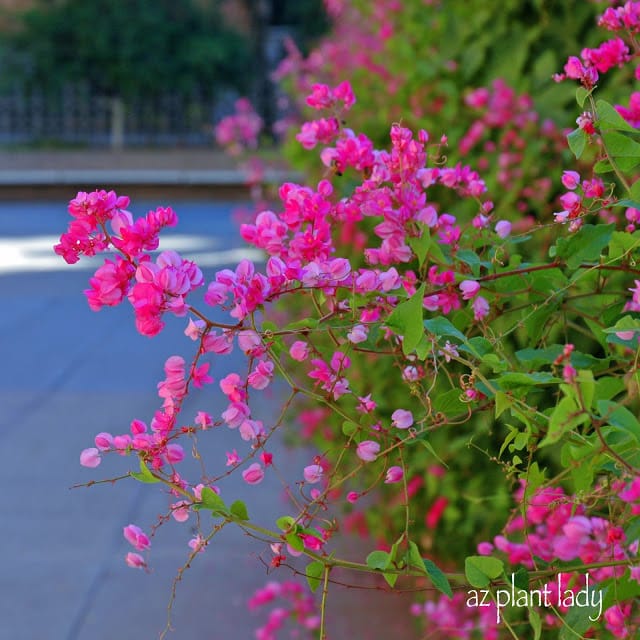Sprays of Pink
The Beauty of Queen Wreath Vine: A Love Affair with Pink

Queen wreath vine (Antigonon leptopus)
Like many women, I have not outgrown my teenage love affair with the color pink. However, instead of painting the walls of my room a vibrant shade of pink or wearing a fluorescent t-shirt, I now content myself with using it in the garden.
Queen Wreath Vine: A Delicate Climber
The Queen wreath vine (Antigonon leptopus), also known by its botanical name Antigonon leptopus, is a charming addition to any garden. Sometimes named Coral Vine or Mexican Creeper, this delicate climber graces my garden with its vibrant pink blossoms, creating a stunning display against the backdrop of my cascalote tree. The allure of pink is something I’ve held onto since my teenage years, and this beautiful vine allows me to incorporate that love into my outdoor space.
Heart-Shaped Buds and Lush Green Leaves

What sets this vine apart are its unique heart-shaped buds that eventually unfurl into beautiful pink blossoms. Paired with its lush green leaves, the vine adds a touch of romance and elegance to my garden. Its ability to climb and twine around my tree’s trunk creates a visual spectacle that I eagerly await each spring.
A Seasonal Wonder
While this special vine brings joy to my garden, it’s important to note that it is not a year-round presence. In the winter, it dies back to the ground, leaving behind only memories of its vibrant display. However, the anticipation of its return in the spring is part of what makes this vine so special. As the temperatures rise and the days grow longer, the vine begins its ascent up the trunk of my tree, signaling the start of another season of enchanting pink blossoms.
How to Grow Queen wreath vine (Antigonon leptopus)
Here’s a list of steps on how to grow this beautiful vine:
- Choose the Right Location: Select a suitable location for planting your Queen wreath vine. It thrives in full sun to partial shade, so make sure it receives adequate sunlight.
- Prepare the Soil: Ensure the soil is well-draining and rich in organic matter. If the soil is heavy or clayey, consider amending it with compost to improve drainage.
- Planting: Plant your Queen wreath vine either by sowing seeds or by transplanting a young plant. Spring is the best time to plant this vine.
- Spacing: Space the plants about 10 to 12 feet apart or provide sturdy support structures for the vine to climb.
- Support Structures: Queen wreath vine is a climbing plant, so it requires a trellis, arbor, or similar structure for support. Install the support system before planting or soon after to avoid disturbing the plant.
- Watering: Keep the soil consistently moist but not waterlogged during the growing season. Once the plant is established, it can tolerate some drought.
- Fertilization: Fertilize your Queen wreath vine with a balanced, all-purpose fertilizer during the growing season. Follow the recommended dosage on the fertilizer package.
- Pruning: Regularly prune the vine to maintain its shape and control its growth. Pruning is typically done in late winter or early spring before new growth begins.
- Winter Care: In colder regions, Queen wreath vine may die back to the ground during winter. Provide a layer of mulch to protect the roots and encourage regrowth in the spring.
- Pest and Disease Management: Keep an eye out for common garden pests like aphids and scale insects. Treat any infestations promptly with appropriate methods or insecticidal soap. This vine is generally resistant to most diseases.
- Propagation: If you want to propagate more Queen wreath vines, you can do so by taking softwood cuttings in the spring or by collecting seeds.
- Enjoy the Blooms: Once established, your Queen wreath vine will reward you with beautiful pink blossoms during the growing season. These heart-shaped blooms will create a stunning visual display in your garden.
Remember that Queen wreath vine can be invasive in some regions, so be cautious and monitor its growth, especially if you’re in an area where it is not native. Enjoy the vibrant beauty and charm this lovely vine brings to your garden.
Have You Met Antigonon leptopus?
Have you ever grown an Antigonon leptopus, also known as Queen wreath vine? For those who haven’t had the pleasure, this pink beauty is a must-have addition to any garden. Its climbing nature and heart-shaped buds make it a captivating plant that adds a touch of whimsy and elegance to your outdoor space. If you’d like to learn more about this delightful vine, be sure to read my earlier post on the subject.
The vine is a testament to the enduring allure of pink in our lives, and I can’t imagine my garden without its vibrant, heart-shaped blossoms.
For more information, you can read my earlier post about this pink beauty.

 Noelle Johnson, aka, 'AZ Plant Lady' is a author, horticulturist, and landscape consultant who helps people learn how to create, grow, and maintain beautiful desert gardens that thrive in a hot, dry climate. She does this through her consulting services, her online class Desert Gardening 101, and her monthly membership club, Through the Garden Gate. As she likes to tell desert-dwellers, "Gardening in the desert isn't hard, but it is different."
Noelle Johnson, aka, 'AZ Plant Lady' is a author, horticulturist, and landscape consultant who helps people learn how to create, grow, and maintain beautiful desert gardens that thrive in a hot, dry climate. She does this through her consulting services, her online class Desert Gardening 101, and her monthly membership club, Through the Garden Gate. As she likes to tell desert-dwellers, "Gardening in the desert isn't hard, but it is different."























Queen’s Wreath is also one of my all time favorite flowers. I have it in my back yard on the back fence. The bees love it and it presses beautifully. I press flowers wherever I go, and queen’s wreath flowers and leaves are some of my favorite subjects. When they are dry, they keep their color wonderfully and I’m able to make cards and pictures that last for years. I have a hard time finding the plant in nurseries, but I have had volunteers come up so I can transplant them.
Hi Mary,
I didn’t know that it dried beautifully. Thanks for the great tip!